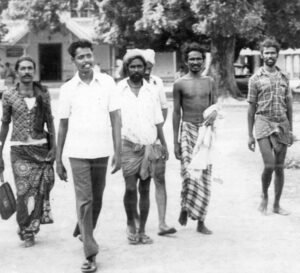Read in : தமிழ்
Narikuravar have a tradition: they will not stay anywhere outside their own dwellings in the night. This is a community rule that narikuravar folk don’t violate. Even children are not exempt from this rule.
Three narikuravar men broke that rule when they spent 15 days in jail for agitating for land rights. They lived away from their colony, in a jail for demanding land rights.
This struggle that happened in Avadi in 1981 was successful. The land the narikuravar community got as a result of that is where students Divya, Priya and Dharshini who petitioned Chief Minister M K Stalin for basic facilities recently live. That request went viral on social media. Stalin called them and inquired about their problems. He assured the students that they would be helped and promised to visit their colony.

Students Divya, Priya and Dharshini from narikuravar settlement in Avadi, petitioned Chief Minister M K Stalin for basic facilities. (Photo credit: Screen grab of the video posted on M K Stalin twitter page)
In the past, people in government used to say that narikuvar are nomadic and don’t stay in one place. Therefore it was useless to give them housing or land. The girl students who met the chief minister have disproved this notion. It shows the narikuvar have been living for 40 years on land they got after a struggle.
The Tamil Nadu Narikuravar Forum was formed in 1980. It struggled for housing, education, and recognition as Scheduled Tribes. It held meetings and conducted rallies in support of its demand where the tribesfolk lived.
Narikuravar want what most people: education, jobs, decent housing and basic facilities. They want to lead settled lives in today’s world.
The Tamil Nadu Narikuravar Forum was formed in 1980. It struggled for housing, education, and recognition as Scheduled Tribes. It held meetings and conducted rallies in support of its demand where the tribesfolk lived.
In 1991, the narikuravar had created a dwelling for themselves in Avadi on Tank Factory Road near the police housing quarters. The police wanted them to vacate but they refused. The police filed a case, took them to the police station and threatened them they would be arrested. But the narikuravar refused to budge. They instead demanded that they should be given pattas for the land that would give them ownership. The police then arrested three narikuravar men and jailed them, leading to them breaking their rule of not staying outside overnight.
The issue took a different turn. Every day groups of narikuravar would come to the Poonamallee sub-jail where the three – Yadagiri, Chandran and Jagadeesan – were lodged. They took a rally from the Poonamallee bus stand to the sub-jail to assert their demands. They would ask to see the three held in the jail. This became a headache for the authorities.

Three narikuravar men released from jail along with activist Bodhi Devavaram.
Narikuravars from other places came and created temporary shelters near the sub-jail in support of their fellow tribesmen. The court released the three arrested in 15 days. Outside the prison, a rally and meeting was held to celebrate the release of the three. Many had gathered for this. The agitation continued.
Then opposition leader M Karunanidhi wrote an article in support of the demands in Murasoli. Invoking a song in which the then chief minister MG Ramachandran had donned the role of a narikkuravar along with Jayalalithaa, Karunanidhi skewered the government.
The government finally cowed down and agreed to give the land where narikuravars were living to them. The land was owned by the police department. It was transferred to revenue department and each of the 22 narikuravar families living there were given one fourth of ground of land each. Pattas were given to them.
The narikuravar families have lived there since then. Some 40 years later, three children from the same settlement have petitioned the chief minister.
The government finally cowed down and agreed to give the land where narikuravars were living to them. The land was owned by the police department. It was transferred to revenue department and each of the 22 narikuravar families living there were given one fourth of ground of land each. Pattas were given to them.
Bodhi Devavaram, an activist, helped the tribe plan and conduct the agitation. Devavaram continues to be active to this day, fighting for the livelihood of the marginalized.
He welcomes the chief minister meeting them and promising to help. He says it is a positive step. But Devavaram cautions that many chief ministers have visited settlements but their lives have not changed much. In Tamil Nadu, the narikuravar are on the list of Most Backward Classes category. “Only if narikuravar are included in the Scheduled Tribe list and programmes implemented to give them basic facilities relating to housing, education and economic development will their lives improve,” he adds.
Read in : தமிழ்











